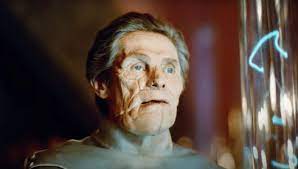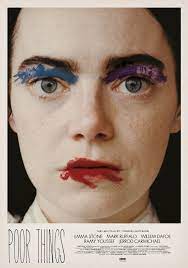The films of Greek director Yorgos Lanthimos are often unpredictable and discomforting. Whether you saw his last outing, “The Favourite,” or if you’re a pioneering fan and remember one of his earliest hits, “Dogtooth,” you know that his films have a way of infiltrating your mind and creating an indelible impression, for better or worse. This is not (entirely) because they disturb and perplex the audience, but more profoundly, because they conjure stories that grapple with ideas and tropes we are familiar with – sex, death, control, societal critique – creating magical, often unprecedented narratives.
Such is the case for his newest film “Poor Things.” Based on Alasdair Gray’s 1992 novel of the same name, adapted for the screen by repeat Lanthimos collaborator, Tony McNamara and starring Emma Stone (“The Favourite”), Willem Dafoe (“The Florida Project”), and Ramy Yousef (“Ramy”) to name a few of many talents; Lanthimos takes these commonly-used motifs and weaves them into an aesthetically beautiful and challenging piece of art. What differs from his previous work, and in my opinion makes it his strongest film, is the fact that despite the complex and at times uncomfortable images on screen, he delivers a film that is undeniably triumphant.

Not a triumph in the way critics laud the newest piece of Oscar-bait. It is genuinely a story of triumph, one that feels like it could reduce to nihilism and cynicism at any moment, but never succumbs to this possibility. And that’s why it is so beautiful. Again, if you have seen any of his previous films (“The Lobster” and “The Killing of A Sacred Deer,” to name a couple more) you know that he has a knack for ending his films on wildly depressing or disquieting notes. But for “Poor Things,” nothing could be farther from the truth.
The plot revolves around Bella Baxter (Stone), a fully-grown adult woman with what seems to be child-like sentience, and begins as many ‘mad scientist and their monsters’ stories do. As the audience, we have relatively little idea what is going on but via the scientist and his compatriot (Dafoe and Yousef, respectively) our understanding is illuminated gradually. Bella grows (or more accurately her mind grows to catch up to her body) and as any newly sentient being does, she begins the quest for knowledge.

What is most fascinating about this specific portrayal of character growth is the reality with which it is crafted. Despite the fantastical locales that defy conventional time periods shown through a kaleidoscopic fish-eye lens and the characters each having their own whimsical ways of being, the conflicts they encounter and their reactions therefrom are believable.
As Bella grows and learns, she encounters a full spectrum of characters from all walks and attitudes. Some have genuine intentions to help Bella, while others are driven by selfish motives. She meets characters who try to teach her, help her, capture her and abuse her. She discovers lines of thought that liberate her and others that undermine her. Like any new-to-the-world human, Bella must navigate these conflicting personalities and ideologies in order to become the person she is destined to be, all of which is immensely enjoyable and exciting to behold.
Ultimately, “Poor Things” emerges as a narrative exploring the myriad manifestations of humanity, and the equally innumerable people, ideas, and circumstances that influence those outcomes. Furthermore, it depicts new ways to interpret the ‘inherent truths’ of our world by introducing us to themes similar to those around us – with a few glaring exceptions as we won’t be seeing a mangled scientist expel manmade gastric juices in this world anytime soon – and allows the audience to observe as these interactions unfold in a manner that diverges from what is normally expected in our own reality.
There is talk of socialism that is refreshing and does not beat us over the head with theory. The film engages in a discourse on the commodification of sex but highlights the agency and power retained by those subjected to commodification within a system that continually exploits them. Toxic relationships are dealt with deftly, and they avoid falling into stereotypical portrayals by instead giving new power to those traditionally represented in films as powerless.

At a time when we could all very much use new ways to imagine the organization, operation and possibilities of reshaping our world on all fronts, this film emboldens its audience by giving a stunning and truly entertaining vision of what is possible. While it does not provide a blueprint for a perfect society or how to destroy patriarchy, racism, or capitalism, it invites viewers to imagine something different for a couple of hours and that is a powerful experience in itself.
“Poor Things” is near the end of its theatrical cycle, but will soon be available for rent or purchase via Apple TV+ and Prime Video later this month before becoming available to stream on Hulu.




